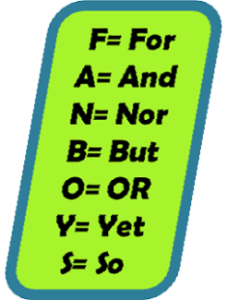- Home
- KS1
- KS1 English
- Conjunctions
I like peas and carrots so I’m going to have them for my dinner!
Our quiz is about conjunctions and looks at joining clauses using ‘and,’ ‘so’ and ‘because’. The National Curriculum states that Key Stage 1 children should know how to join clauses using conjunctions as part of the sentence level requirements. This will aid their English writing and literacy.
Sometimes our short sentences can be joined together to make one longer sentence. We can join two sentences with conjunctions, or joining words. Some conjunctions help you to add information to the first sentence. By using ‘and,’ ‘because’ and ‘so’ you can then go on to provide more information.
To see a larger image, click on the picture.
1.
Finish this sentence: He ran away because…
she failed to catch it.
he danced all night.
he was scared.
she had two teeth missing.
2.
Finish this sentence: The lake was frozen so…
she didn’t hurt herself.
she polished her shoes.
headed the ball in the goal.
we couldn’t go fishing.
3.
‘Taj likes ice cream.’ Which conjunction and clause should follow?
because he could eat it all day long.
so and could eat it all day long.
and could eat it all day long.
could eat it all day long.
4.
‘Lorraine fell off her bike last time.’ Which answer could follow?
because this time she wore a helmet.
and then this time she wore a helmet.
so this time she wore a helmet.
or this time she wore a helmet
5.
Which word is not a conjunction?
6.
Which sentence is perfect?
Chimps like bananas because they are yummy.
They are yummy because chimps like bananas.
chimps like bananas they are yummy because.
because chimps like bananas they are yummy.
7.
Which sentence is perfect?
There was a thunderstorm because we weren’t allowed outside to play.
There was a thunderstorm so because we weren’t allowed outside to play.
There was a thunderstorm so and we weren’t allowed outside to play.
There was a thunderstorm so we weren’t allowed outside to play.
8.
‘She fell asleep at her desk.’ Which sentence should follow?
because she stayed up all night.
so she stayed up all night.
and she stayed up all night.
yet she stayed up all night.
9.
Finish this sentence: David fell over and…
bumped his head.
undone his tie.
went to the park.
said hello.
10.
Which sentence isn’t correct?
She loved her horse and went riding every day.
She wanted to buy another horse so she would have two to ride.
She rode this horse because he was her favourite.
She liked horses and he was her favourite because he was the best so she rode him every time because it seemed like the right thing to do and was probably kind to the horse as he liked to be ridden.
Great! You’re enjoying learning by quizzing
You’ve had your free 15 questions for today. For unlimited access to all quizzes, games and more, you’ll need to subscribe.
If you wish to subscribe straight away, visit our Join Us page.
Or take a look around the website and start at our Home page. Colin
This study provides a concise description of aspects of the phonology, morphology and syntax of a little-studied Hui variety of Sinitic language, Tunxi Hui, with only about 70,000 speakers. Conducted within the framework of linguistic typology, this dissertation makes use of both spontaneous and elicited data, transcribed selectively based on fields of interest. Phonologically, Tunxi Hui possesses twenty consonants, a rich inventory of vowels, especially diphthongs, and a very complex system of tone sandhi patterns. Morphologically, reduplication, affixation and compounding are the three major strategies of word formation of this conservative Sinitic language with high proportion of mono-morphemic words. In terms of syntax, a range of specific syntactic constructions of Tunxi Hui are examined, including the strong and weak personal pronouns, attributive modification and the categoriality of ‘adjectives’, pronominal modification, verbal phrases including serial verb constructions, passive constructions and pretransitive structures, comparative constructions, adverbial modification, the issue of word order and topicalization, and last but not least, coordination and subordination. Many of the above features of Tunxi Hui demonstrate characteristics intermediate between the Northern Mandarin and Southern Sinitic languages (Hashimoto 1976, 1986, Norman 1988, Chappell 2015), which justifies the typological categorization of Tunxi Hui as a transitional type of Sinitic language — a ‘missing link’ between the Northern and Southern type.
Add your answer:
Earn +
20
pts
Q: Which word is not a conjunction but not yet so?
Write your answer…
Made with 💙 in St. Louis
Copyright ©2023 Infospace Holdings LLC, A System1 Company. All Rights Reserved. The material on this site can not be reproduced, distributed, transmitted, cached or otherwise used, except with prior written permission of Answers.
Lexicon Valley
Disclaimer: Although Geoff Pullum literally wrote the book on English grammar, his views regarding the word “because” do not necessarily reflect those of @lexiconvalley.
Many people were somewhat surprised that the American Dialect Society’s “Word of the Year” was because in its use before a noun or noun phrase, as in “Because Science” (to choose a recent Slate headline). It is perhaps unprecedented for a word in a minor part-of-speech category, in this case preposition, to be chosen over an emergent or fashionable word in one of the major categories. Here are some recent winners:
2012 — hashtag (noun)
2011 — occupy (verb)
2010 — app (noun)
2009 — tweet (noun and verb)
2008 — bailout (noun)
2007 — subprime (adjective)
2006 — plutoed (past participle of a verb)
2005 — truthiness (noun)
You’ll note that I referred to because as a preposition, which warrants some explanation given the remarkable fact that seemingly every dictionary on the market, as far as I can tell, disagrees. For example, the American Heritage Dictionary, whose entry is representative, reports that because is a conjunction, but also that there is a word spelled because of that is a preposition. Both claims are flamingly and demonstrably wrong and here’s why.
Traditional grammar recognizes that conjunctions come in two varieties: subordinating conjunctions and coordinating conjunctions. But because isn’t like either.
The classic subordinating conjunction is that (that can also be a pronoun, an adjective, or an adverb, but those are different usages). As a conjunction, that introduces a subordinate clause, as in Ted says that the world is flat—clauses that are nearly always what is called a complement. In other words, they are required or specifically licensed by the foregoing main clause word, in this case says. That is meaningless in its own right, and often omissible: Ted says the world is flat is a grammatical alternative. Also, shifting that and the clause it introduces to the beginning often sounds pretty weird. That the world is flat, Ted says only makes sense in certain special contexts in which different things Ted says are being contrasted with one another.
None of this holds for because, as seen in a sentence like Ted is mocked because he holds ridiculous beliefs. Here, because introduces a clause that is never a complement; rather it is always an optional adjunct. Because is not meaningless, but contributes a crucial logical relation of cause or reason. The word can never be omitted without radical change to the meaning and, usually, the grammatical integrity of the sentence: Ted is ridiculed he holds ridiculous beliefs is not grammatical. And shifting it to the front is perfectly natural: Because he holds ridiculous beliefs, Ted is mocked.
The classic “coordinating conjunction” is and, as in Roses are red and violets are blue. Switching the positions of the two clauses separated by the and normally gives a grammatical result with the same truth conditions: Violets are blue and roses are red is true if and only if Roses are red and violets are blue is true. Preposing the and plus what follows it is not permitted: And violets are blue, roses are red is totally ungrammatical.
The opposite of all of this holds for because. The sentence Roses are red because violets are blue may express a strange claim, but it has a completely different meaning from Violets are blue because roses are red (the causal arrow is reversed). Also, Because violets are blue, roses are red is a grammatical, alternative way of expressing the same thing as Roses are red because violets are blue.
Why then do all dictionaries make the self-evidently false claim that because is a conjunction, and therefore either like that or like and? In short, they are all followers of a tradition that has needed rethinking for 200 years (some would say it’s more like 2,000 years, because it originates in classical times). They are respecting an ancient analysis that doesn’t work. It is based on the vague assertion that a conjunction is a word that “joins” two elements together. Very little thought is required to see that if using C to join A together with B means simply forming the sequence “A C B,” then almost anything can be called a conjunction; no stricter or more tightly framed definition has been given.
Which brings us to the similarly mindless claim that there is a preposition spelled because of. First off, I would never claim that a dictionary should not recognize something as a word if it has a space in it; I think Santa Cruz is best thought of as a word, and there are certainly space-containing words that are not proper nouns. But because of isn’t one of them. There is no preposition because of. These are two separate words, with their own functions, capable of being widely separated by other words.
Of, naturally, is indeed a preposition. It is the commonest and most stereotypical of all prepositions in English. But what about because? Contrary to what all the dictionaries tell us, it is also a preposition. To explain:
1. Some prepositions can occur with no complement, as in: We went in ;
2. Some can occur with a noun phrase (NP), as in: We went through the front door;
3. Some can occur with a clause, as in: My son is waiting for me to pick him up;
4. And some can occur with a preposition phrase (PP) that begins with of, as in: They did it out of ignorance.
The change that has caught the eye of the American Dialect Society is simply that because has picked up the extra privilege already possessed by many other prepositions: it now allows a noun phrase (NP) as complement. So, in the following table of prepositions (the rows) and their complement categories (the columns), a single entry has been changed (✓ means ‘grammatically permitted,’ * means ‘grammatically forbidden,’ and % means ‘grammatically permitted in some semantically limited contexts’):
| nothing | NP | of-PP | clause | |
| in | ✓ | ✓ | * | * |
| out | ✓ | % | % | * |
| since | ✓ | ✓ | * | ✓ |
| of | * | ✓ | * | * |
| because | * | * | ✓ | ✓ |
The language has simply added to its stock of grammatical possibilities a single check mark, replacing the second asterisk in the last row. And if you would like the dictionary to cover (as Wiktionary does) the colloquial use of because on its own, as an imperiously uninformative answer to a why question—as in, “Why do I have to eat my vegetables? Because!”—then we can get rid of the first asterisk as well, and the relevant line will look like this:
| nothing | NP | of-PP | clause | |
| because | ✓ | ✓ | ✓ | ✓ |
Because is a preposition that is sometimes used with no complement, sometimes (in the new usage that the ADS has just recognized) with an noun phrase complement, sometimes (much more commonly) with an of-PP complement , and sometimes with a clause. That’s an accurate classification, which dictionaries ought to adopt because, well … because syntax.
A version of this post originally appeared on Language Log.
-
Language
-
Lexicon Valley
Conjunctions are words which join phrases, clauses and sentences. There are three types of conjunctions in English: coordinating conjunctions, correlative conjunctions and subordinating conjunctions.
This article will explain a little about what conjunctions are and how they should be used. Conjunctions are words or phrases that are used to join two independent clauses together.
There are three kinds of conjunctions: Coordinating, Subordinating and Correlative Conjunctions
Coordinating Conjunctions
Coordinating conjunctions are and/or/but/nor/as/for/so. When they are used to connect two independent clauses together they should be accompanied by a comma, which comes before the coordinating conjunction.
Here are some examples of coordinating conjunctions in English and what they do:
- For – presents rationale (“They do not gamble or smoke, for they are ascetics.”)
- And – presents non-contrasting item(s) or idea(s) (“They gamble, and they smoke.”)
- Nor – presents a non-contrasting negative idea (“They do not gamble, nor do they smoke.”)
- But – presents a contrast or exception (“They gamble, but they don’t smoke.”)
- Or – presents an alternative item or idea (“Every day they gamble, or they smoke.”)
- Yet – presents a contrast or exception (“They gamble, yet they don’t smoke.”)
- So – presents a consequence (“He gambled well last night, so he smoked a cigar to celebrate.”)
Subordinating Conjunctions
A subordinating conjunction is a word that connects a main clause to a subordinate clause. A main clause is an independent clause that can stand alone by itself as a sentence. In other words, a main clause does not need any additional information to operate as a sentence.
A subordinating conjunction is a word that connects a main clause to a subordinate clause. A main clause is an independent clause that can stand alone by itself as a sentence. In other words, a main clause does not need any additional information to operate as a sentence.
For Examples:
Than, rather than, whether, as much as, whereas, that, whatever, which, whichever, after, as soon as, as long as, before, by the time, now that, once, since, till, until, when, whenever, while, though, although, even though, who, whoever, whom, whomever, whose, where, wherever, if, only if, unless, provided that, assuming that, even if, in case (that), lest, how, as though, as if, because, since, so that, in order (that), that, as …
How to use Subordinating conjunctions in Sentences:
In English, there are lots of subordinating conjunctions, but the most common ones, along with a few examples of how subordinating conjunctions are used, are as follows:
- He is cleverer than I am.
- You must decide whether you will go by train or by plane.
- I eat as much as you.
- Elliot is tall and blond, whereas his brother is short and has dark hair.
- She went to the school that my father went to.
- I copied in my notebook whatever he wrote on the blackboard.
- The car which I drive is old.
- Bruce will wear his pink or green sweater, whichever is clean.”
Correlative Conjunctions
Correlative conjunctions work in pairs to join words and groups of words of equal weight in a sentence. There are many different pairs of correlative conjunctions:
For Examples:
- both…and,
- either…or,
- neither…nor,
- whether…or,
- not only…but also,
- such…that,
- scarcely…when,
- no sooner…than
How to use Correlative conjunctions in Sentences:
- She played both hockey and basketball when she was a student.
- I will eat either carrots or peas for dinner.
- Natale, likes neither milk nor cream cake.
- Do you care whether we have noodles or rice for dinner?
- Not only will they paint the outside of the house but also the inside.
- He is such a bad-tempered person that no one can work with him for long.
- Scarcely had she finished reading when she fell asleep.
- No sooner did he enter the room than he saw a snake.
How to Use Conjunctions in English | Images
How to Use Conjunctions in English | Image 1
How to Use Conjunctions in English | Image 2
How to Use Conjunctions in English | Image 3
How to Use Conjunctions in English | Image 4
How to Use Conjunctions in English | Image 5
Что такое союз в английском языке?
Союз или conjunction – это служебная часть речи, которая логически связывает слова, фразы и части предложения. Союзы в английском языке отличаются тем, что они не изменяются и не зависят ни от каких грамматических характеристик соединяемых слов.
Союзы могут классифицироваться по строению или по функции в предложении.
Английские союзы по строению:
- Простые или однословные (simple) — состоят из одного корня.
- Производные (derived conjunctions)
- Сложные (compound conjunctions) — состоят из двух корней
- Составные или многословные (composite conjunctions) — состоят из нескольких слов
- as soon as — как только
as if — как будто
in order to – чтобы - in case – в том случае, если
but — а, но
and — и
till — пока
that — что
if – если
after — после того, как
— произошли от других частей речи и имеют в своем составе приставку или суффикс
until — (до тех пор) пока
unless — если… не
however (how + ever) — тем не менее
therefore (there + fore) – поэтому
whereas (where + as) – тогда как, в то время как
К составным относятся и двойные союзы (или парные). Такие союзы знакомы многим из нас, так как именно в предложениях с такими словами может таиться опасность.
neither… nor — ни… ни
either… or — или… или
not only… but — не только…, но и
both… and — и… и, как… так и
Английские союзы по их функции в предложении
Считается, что английские союзы делятся на две большие группы: сочинительные и подчинительные.
Некоторые исследователи английской грамматики выделяют еще одну группу – соотносительных союзов (или коррелятивных).
Типичные представители этой группы – это такие наши знакомые, как “neither… not”, “not only… but also” и так далее. Но мы с вами поговорим о них, когда будем вспоминать о сочинительной группе.
Сочинительные союзы
Сочинительные союзы в английском языке (или Coordinating Conjunctions) соединяют отдельные слова, фразы или равноправные предложения в составе сложносочинённого предложения. Они указывают на смысловое равенство единиц, которые связываются благодаря им.
Конечно же, такие союзы делятся на свои собственные подгруппы, в зависимости от того, какую функцию они выполняют в предложении.
- Соединительные союзы (copulative conjunctions). Как понятно из названия, такие слова прежде всего соединяют части предложения или фразы. Они служат для установления отношений равенства. К ним относится наш хорошо знакомый друг – слово “and” (в значении «и»). Ему составляют компанию nor, neither… nor, not (only) … but (also), both… and
He is both an intelligent boss and a good husband. – Он не только умный начальник, но и хороший муж. - Противительные союзы (adversative conjunctions). Такие слова выражают противопоставление, то есть несоответствие одного компонента другому. К ним опять же относится слово “and” (в этот раз в значении «а»), but, still, yet, however, nevertheless. Противительные союзы выражают противопоставление, несоответствие одного компонента другому.
This car is too expensive; however, it is worth it. – Эта машина слишком дорогая. Однако, она того стоит. - Причинно-следственные союзы (causative-consecutive). Они показывают, что действие в придаточном предложении является результатом или причиной действия в главном предложении. К ним относятся so, thus, for.
It was too cold, so I didn’t go there. – Было слишком холодно, поэтому я туда не пошел. - Разделительные союзы (disjunctive). Это – самая малочисленная группа. Еще бы, кто же хочет выражать отношений разделения и взаимоисключения. Так что тут надо знать всего два слова: or и either… or
You can either go there or stay at home. – Вы можете или пойти туда, или остаться дома.
Подчинительные союзы
Подчинительные союзы в английском языке (или Subordinating conjunctions) соединяют придаточное предложение с главным. Так и получаются сложноподчиненные предложения. Таких слов в английском языке довольно много. Они делятся по подгруппам, в зависимости от того, какой именно вид придаточного предложения вводит данное слово.
- Изъяснительные cоюзы (objective, subjective, predicative). Они вводят придаточное предложение, поясняющее и расширяющее содержание главного предложения. Проще говоря, к изъяснительным относятся наши старые знакомые If и that.
I’m afraid that I will be late. – Я боюсь, что я опоздаю. - Причинные союзы (of reason/cause). Они указывают на причину действия в главном предложении. К ним относятся as, since, because, because of, seeing, so/now … that, seeing… that, considering.
She is upset because her boyfriend broke up with her. – Она расстроена, потому что ее бросил парень. - Временные союзы (of time). Такие слова вводят придаточное предложение, в котором указывается время осуществления действия. Это when, sinсе, while, as sоon as, as long as, as, till, until, before, after.
I’ll stay with you as long as you need me. – Я буду с вами до тех пор, пока я вам нужна. - Целевые союзы (of purpose). Они вводят придаточное предложение, которое указывает цель, ради которой совершается действие в предложении. К ним относятся that, in order to/that, so that, lest/for fear that.
You have to work harder in order to get a promotion — Тебе нужно работать усерднее, чтобы получить повышение. - Уступительные союзы (concessive).
Союзы в английском языке (conjunction): виды и функции, примеры употребления, таблица популярных союзов с переводом — SPEAK ENGLISH
26.02.2019
Союз – это служебное слово, которое употребляется для соединения членов предложения или предложений. Союз не является членом предложения, так как не несет никакой самостоятельной функции.
1. Сочинительные союзы
Сочинительные союзы служат для соединения однородных членов предложения, а также независимых друг от друга предложений. Они бывают простыми и составными.
| and – и, а |
|
| but – но | It is an old car, but it is very reliable – Это старая машина, но она очень надежная. |
| or – или | Shall we go out to the cinema or stay at home? – Пойдем в кино или останемся дома? |
| while – тогда как, в то время как | They arrived while we were having dinner – Они прибыли, в то время как мы ужинали. |
| whereas – тогда как, а | The old system was complicated whereas the new system is very simple – Старая система была сложная, а новая – очень простая. |
| as well as – так же как (и), а также | She’s got a cat as well as a dog – У нее есть кошка, а также собака. |
| both… and – и…и, как…так и | I spoke to both the Director and her secretary – Я поговорил и с директором, и с ее секретарем. |
| either…or – или…или | You can have either tea or coffee – Ты можешь выпить или чай, или кофе. |
| neither…nor – ни…ни | Neither James nor Virginia was at home – Ни Джеймса, ни Вирджинии не было дома. |
| not only…but also – не только…но и | We go there not only in winter, but also in summer – Мы ездим туда не только зимой, но и летом. |
2. Подчинительные союзы
Подчинительные союзы соединяют главное предложение с придаточным.
Союзы, вводящие придаточные предложения, которые могут выполнять роль подлежащего, сказуемого и дополнения:
|
|
Союзы, вводящие обстоятельственные придаточные предложения времени:
|
|
Союзы, вводящие обстоятельственные придаточные предложения причины:
|
|
Союзы, вводящие обстоятельственные придаточные предложения условия:
|
|
Союзы, вводящие обстоятельственные придаточные предложения цели:
|
|
Союзы, вводящие обстоятельственные придаточные предложения образа действия:
|
|
Союзы, вводящие обстоятельственные придаточные предложения сравнения:
|
|
| Союзы, вводящие обстоятельственные придаточные предложения следствия: | The goods were loaded on Monday so that the train was able to leave on Tuesday – Товары были погружены в понедельник, так что поезд мог отправиться в дорогу во вторник. |
Союзы, вводящие обстоятельственные придаточные предложения уступки:
|
She cooks pasta perfectly though she is not a good cook – Она отлично готовит пасту, хотя она не такой хороший повар. |
3. Союзные слова
Союзные слова, как и союзы, служат для связи придаточного предложения с главным, но при этом выполняют функцию одного из членов предложения.
|
|
Грамматика английского языка в таблицах и схемах с примерами
Английские союзы в таблице
Таблица. Союзы (Conjunctions).
| 1. Простые (simple) | and, if, that, when |
| 2. Производные (derivative) | although, before, until |
| 3. Составные (compound) | whereas, wherever, as well as, both … and |
| По роли в предложении | |
| 1. Сочинительные(Coordinating Conjunctions) | and — и, a, but — но, or — или, whereas — тогда как, as well as — так же как, both … and — как…, так и, either … or — или … или, neither … nor — ни … ни, not only … but also — не только … но также |
| 2. Подчинительные(Subordinate Conjunctions) | that — что, if — если, whether — лиwhen — когда, while — в то время как, before — до, after — после того как, till (until) — до тех пор покаas — как, as long as — до тех пор, as soon as — как только, since — с тех пор какthat — чтобы, in order that — с тем, чтобы, so that — так чтобы, lest — чтобы неbecause — потому что, since — поскольку, as — так как, for — ибоif — если, unless — пока не, provided (that) — при условии (что), supposing — допустим, что, in case — в случаеthough, although — хотя |
| 3. Союзные слова(Conjunctive Words) | who — кто, который, whose — которого, what — что, который, which, that — который, when — когда, where — где, how — как, why — почему |
| 4. Сравнительные союзы(Comparative Conjunctions) | than — чем, as … as — такой … как, not so … as — не такой … как, the (more) … the (less) — чем … тем |
| Употребление | |
| 1. Сочинительные | There were some books and a paper on the table.Там были какие-то книги и статья на столе.He finished his work and the data were published.Он закончил свою работу и данные были опубликованы. |
| 2. Подчинительные | That he has written the paper is quite certain.То, что он написал в статье, вполне определенно.The question is if (whether) he will come.Вопрос состоит в том, придет ли он.He said that he had done it.Он сказал, что он сделал это.She will do it when she returns.Она сделает это, когда она вернется.As it was raining, we stayed at home.Так как был дождь, мы остались дома.She must hurry lest she (should) be late.Она должна спешить, чтобы не опоздать.I shall do this work if I have time.Я сделаю эту работу, если у меня будет время.Though he was very young, he was a good worker.Хотя он был очень молод, он был хорошим работником. |
| 3. Союзные слова | Who can do it is not known.Кто может сделать это, неизвестно.He did not tell us when he had done it.Он не сказал нам, когда он это сделал.Here is the book which (that) we have spoken about.Вот книга, о которой мы говорили.The plant grows where the others couldn’t.Растение растет там, где другие не могли. |
| 4. Сравнительные союзы | The result of the experiment is much better than that of the previous one.Результат эксперимента гораздо лучше, чем у предыдущего.He works as well as his friend does.Он работает так же хорошо, как и его друг. |
| Перевод: союзами |
Интерактивная таблица грамматики английского языка с озвученными выражениями.
Английская грамматика в таблицах
Союзы в английском языке: таблица с переводом
Союзы в английском языке – это одна из девяти частей речи, отвечающая за смысловое соединение слов, словосочетаний и предложений. Самым распространенным союзом, как в русском, так и в английском, является «и» (and).
Союзы английского языка: таблица союзов, упражнения на использование

Союзы в английском языке, как и в русском, — это части речи, служащие для соединения слов словосочетаний и предложений.
В английском языке союзы могут состоять:
- из одного слова: and, by, as, because yet, etc.
- из нескольких слов (in case, as soon as, on condition (that), in spite of, so that, etc.),
- а также употребляться в пape (both … and, neither… nor, as… as, etc.) – это так называемые парные союзы
В зависимости от характера синтаксической связи союзы в английском языке подразделяются на:
- сочинительные союзы (coordinate conjunctions) — соединяют однородные члены простого предложения или части сложносочинённого предложения, а также отдельные предложения;
- подчинительные союзы (subordinate conjunctions) — соединяют главное предложение с придаточным в сложноподчинённом предложении и указывают на тип придаточного: времени, причины, характера действия и пр.
Таблица сочинительных союзов с переводом и примерами
К сочинительным союзам относятся and, but, or, both … and, neither … nor, yet. nevertheless, besides, however, therefore, so, moreover, etc.
Сочинительные союзы могут передавать такие значения, как: добавочная информация, пояснение, противопоставление, контраст, обобщение и т.д.
| Союзы с переводом | Примеры употребления |
| And – и (a / но) | I ordered a few pizzas and we settled down comfortably to discuss the latest news. |
| But — но | This method of teaching is widely used but it’s not yet clear that it’s the best method. |
| Or — или | The stew is so thick that you can eat it with a fork or spoon. |
| Both…and – как … так и | Both my friends and my relatives came to my party. |
| neither … nor – ни … ни | Neither my friends nor my relatives came to my party. |
| Either … or – или… или / либо … либо | Either my brother or my sister is at home |
| Yet — однако, тем не менее; всё же, несмотря на это; но | She was angry with me, yet I didn’t care. |
| Nevertheless — тем не менее, однако, несмотря на; всё-таки | They tried their best to calm me down, nevertheless l couldn’t help feeling excited. |
| Besides – сверх того, кроме того | Jane attends French classes twice a week. Besides she does yoga on Fridays. |
| However — однако | Tom has a lot of experience: however, he didn’t get the job. |
| So – так что, поэтому, для того, чтобы | John spent seven hours studying, so now he can go for a walk. |
| Moreover — сверх того, кроме того | I got a nice salary, moreover they gave me a company car. |
| Therefore — вследствие этого, поэтому | The dollar has gone down against the yen. Therefore Japanese goods are more expensive than American. |
| Nor — также не, тоже не | Rick refuses to eat cat food, nor will he touch the milk. |
Таблица подчинительных союзов с переводом и примерами
Придаточные времени вводятся следующими союзами:
| Союзы с переводом | Примеры употребления |
| After – после (того) | I will go home after I complete the work |
| as soon as – как только | As soon as I am ready I’ll give you a call |
| as long as – пока, до тех пор, пока | I will be happy as long as you love me. |
| Before – до (того) | Before you go to bed, clean your room |
| Till –пока, до тех пор пока (не) | We can’t do anything till they approve of our plan. |
| Until — пока, до тех пор пока (не) | We can’t do anything until they approve of our plan. |
| When — когда | I’ll go out when the rain stops |
| Whenever – когда бы ни, всякий раз когда | I come whenever you need me. |
| While — пока | What happened while I was gone? |
Возможно, вам будет интересно прочесть статью о союзах till и until.
Придаточные условия вводятся следующими союзами:
| Союзы с переводом | Примеры употребления |
| If – если | I’ll go for a walk if the weather is fine. |
| even if – даже если | I’ll go for a walk even if the weather is rainy. |
| in case – в случае / на случай | He took a torch in case there was no light in the attic. |
| Provided (that) — при условии, если только; в том случае, если | Provided that all is safe, you may go. |
| Unless – если не | Wе’ll go for a walk unless it rains |
| Once – раз уж, так как (уже) | Once you’ve completed all that work, you might go home |
Возможно, вам будет интересно прочесть статью об употреблении союза unless.
Придаточные места вводятся следующими союзами:
| Союзы с переводом | Примеры употребления |
| where | I don’t know where to go |
| wherever | Now that you have a car you can go wherever you want. |
Придаточные причины / цели вводятся следующими союзами:
| Союзы с переводом | Примеры употребления |
| Because – потому что | I’m angry because she’s let me down |
| Since – так как | Since she is right, you are mistaken. |
| As – так как | She was late, as she had got stuck in the traffic jam |
| in order that — чтобы | She got up earlier in order that not to be late |
| so that – так чтобы | She swept the leaves away so that she could sit. |
Придаточные образа действия (в том числе сравнения) / уступки вводятся следующими союзами:
| Союзы с переводом | Примеры употребления |
| just as – точно так же | God was God’s name just as his name was Stephen. |
| Whereas — тогда как; несмотря на то, что | Global warming has a negative impact on third-world agriculture, whereas it has a positive impact on first-world farming |
| As — словно | I feel her, as she is here |
| Although – хотя | She insisted on her idea, although she was not right. |
| even though — даже если, хотя | There was something alive in my thoughts even though time had mellowed them. |
| Though –хотя | She insisted on her idea, though she was not right. |
| As if | He behaves as if he were the boss here |
Обратите внимание: некоторые союзы, в частности, since, after, before, until омонимичны по форме с предлогами и наречиями.
Теперь, когда вы познакомились с основной частью союзов в английском языке, предлагаю Вам выполнить упражнения на их употребление.
Упражнения на союзы
Упражнение 1. Make up compound sentences by using the right coordinating conjunctions in brackets.
- His job is very hard, (yet / therefore) his salary is low.
- I’m sorry I opened your handbook, (however / but) I mistook it for mine.
- Alex lost his job a year ago, (however / or) he soon managed to find another one.
- I know she’s hard to deal with, (and / nevertheless) you ought not to be rude to her.
- I’ve been living here for many years, (but / and) I don’t know the place very well.
- Her life is very peaceful,l (or / yet) she is always complaining.
- We haven’t got much in common, (moreover / but) we get on with each other fairly well.
- Тоm is 17 (or / and) he is studying at college.
- The rent is reasonable, (moreover / but) the location is perfect.
Enjoy learning English online with Puzzle English for free
Союзы служат для связи слов или предложений. Английские союзы различаются между собой тем, какие элементы они связывают, какой устанавливают характер отношений, а также в зависимости от своей формы.
Союзы относятся к служебным частям речи и внешне не изменяются. К таким словам невозможно добавить показатели числа или лица. Их значение в предложении определяется тем, как фрагменты фразы соотносятся друг с другом и в какое отношение вступают.
Союзы в предложении
Функция союзов — связывать разные элементы друг с другом. Этими элементами могут быть как отдельные слова, так и целые предложения.
Самый распространенный союз — and (и). На его примере покажем, между какими элементами может устанавливаться связь.
- Соединяться могут отдельные слова любых частей речи:
- I bought apples and bananas — Я купил яблоки и бананы.
- This movie is so interesting and thrilling — Этот фильм такой интересный и захватывающий.
- Или словосочетания:
- I saw the doctor from the local hospital and his beautiful wife — Я видел доктора из местной больницы и его красивую жену.
- Союзы английского языка могут объединять целые предложения:
- Alice is asleep upstairs and Bobby is playing in the garden — Алиса спит наверху, а Бобби играет в саду.
Alice is asleep upstairs. And Bobby is playing in the garden — Алиса спит наверху. А Бобби играет в саду.
Типы союзов в английском языке
Чистое соединение элементов — не единственная роль союзов в английском языке. В дополнение к связи они могут также вносить различные значения. По характеру связи в английском языке выделяются:
- Сочинительные союзы — coordinating conjunctions
- Подчинительные союзы — subordinating conjunctions
По форме союзы делятся на:
- Простые союзы — simple conjunctions
- Сложные союзы — compound conjunctions
- Составные союзы — composite conjunctions
Сочинительные союзы
Особенность сочинительных союзов в том, что два связанных элемента имеют равнозначный статус. Если такой союз объединяет однородные члены предложения, то они зависят от одного и того же слова. Если союз связывает предложения, то они равнозначны по смыслу и не зависят друг от друга.
- К сочинительным союзам английского языка относятся: and — и, а or — или nor — также не but — но either… or — или… или neither… nor — ни… ни
- В качестве связываемых элементов могут участвовать различные части речи и фрагменты различной длины:
- It was cold but sunny — Было холодно, но солнечно.
- I called her but she didn’t answer — Я позвонил ей, но она не ответила.
Conjunctions: какими бывают союзы и их роль в английском
Поговорим немного о союзах в английском языке.Поговорим немного о союзах в английском языке.Neither I nor my friend knew conjunctions before.
Conjunctions – служебная часть речи, связывающая слова, предложения или их отдельные зависимые части. Не являются членами предложения. К союзу не задать вопрос от какого-либо слова. По этим критериям мы их распознаем.
- Сложно?
- К счастью, союзы не изменяются по форме и их легко запомнить.
- Союзы делятся на несколько групп: сочинительные союзы и подчинительные, отдельно выделяют парные союзы и союзные наречия.
Сочинительные союзы
Соединяют равные по значимости слова, однородные члены предложения, независимые предложения
- and – и
- but – но
- yet – однако/но
- for – что/ввиду того
- nor – ни/также не
- so – так что/поэтому
- or – или
Не забудьте поставить запятую перед союзом, соединяющим независимые предложения. Её можно опустить только в случае, если предложения ну очень короткие. А однородные члены предложения и вовсе не нуждаются в запятых.
Do you want some tea or coffee? (Ты хочешь немного чаю или кофе?)
Подчинительные союзы
Соединяют только зависимые от основного предложения, поэтому их и называют придаточными.
- after – после того/как
- as – так как
- although – не смотря на то/хотя
- because – потому что
- before – перед тем
- how — как
- if — если, once – как только
- since – с тех пор/так как
- than – чем/разве только
- that – что/чтобы
- though – хотя/не смотря на
- till – до тех пор/ пока
- until – до тех пор
- unless – пока не/ если не
- whenever – всякий раз/ когда бы ни
- whether — ли
- while – в то время как
- where — где
- when — когда
Союз всегда ставится в начале зависимого предложения, запятая не ставится.
You’ll get your computer back after you finish the homework (Ты получишь свой комп после того, как ты закончишь уроки)
Парные союзные
Соединяют слова, однородные члены предложения и равные части одного предложения.
- both…and – и…и
- just as…so – как…так и
- either…or – или…или
- neither…nor – ни…ни
- not only…but – не только…но и
- whether…or – то ли…то ли
- rather…or – или…или
- if….then – если…то
Запятая зачастую не ставится. Можно поставить только в случае, если есть необходимость выделить интонационно или при соединении нескольких длинных фраз.
Both I and my friend become specialists in conjunctions (И я, и мой друг стали специалистами по союзам)We’ve just learnt not only conjunctions, but also their value (Мы только что узнали не только союзы, но и их значение)
Союзные наречия
Соединяют два независимых предложения в одно сложносочиненное.
- after all – тем не менее
- as a result – в результате
- in fact – на самом деле
- also – к тому же
- in other words – другими словами
- in addition – в дополнение
- meanwhile – между тем
- besides – кроме того
- moreover – более того
- consequently — следовательно
- on the other hand – с другой стороны
- for example — например
- therefore – по этой причине
- however — однако
- thus – таким образом
- then — потом
Ставятся в начале предложения, выделяется запятой.
The last party was awful. Moreover, I was disappointed (Последняя вечеринка была ужасной. Более того, я был разочарован).
All the best!
Читаем далее:
- Какие бывают вопросы в английском?
- Псс… Не хотите ли немного слов-паразитов?
- Самые интересные фразеологизмы
#crazypinglish #english language #наука и образование #саморазвитие #английский онлайн #уроки английского
Союзы в английском языке и что они соединяют
Союзы в английском языке — это служебные слова, которые 1) соединяют слова в простом предложении, 2) соединяют части сложного предложения. Например:
- Простые союзы — состоят из одного слова
Nice and fluffy. — Милый и пушистый.
Small but proud. — Маленькая, но гордая.
- Составные союзы — состоят из нескольких слов
He was running as if a dog was chasing him. — Он бежал так, будто за ним гналась собака.
You can park by the mall as long as there are no customers. — Вы можете парковаться у торгового центра, но лишь пока нет покупателей.
Иногда также выделяют производные союзы — образованные от других частей речи (until, unless), и сложные — состоящие из двух корней (however, moreover).
Союзы и союзные слова в английском языке
- Несколько отличаются от союзов так называемые союзные слова, к которым относят местоимения: that — который, where — где, how — как, why — почему, who — кто, который, what — что, which — который, whose — чей, when — когда.
- Их особенность в том, что, во-первых, они используются не только в роли союзов, но и в роли местоимений, во-вторых, что они не только связывают части предложений, но и являются членами придаточных предложений (обычные союзы не являются членами предложений).
- Например:
He is the man who found the treasure. — Он тот человек, который нашел сокровище (who — подлежащее)
I don’t know what you shold do. — Я не знаю, что тебе следует делать (what — дополнение).
Примеры предложений с союзными словами будут приведены ниже, когда мы будем разбирать сложноподчиненные предложения.
Союзы в простых и сложных предложениях
В простом предложении союзы соединяют однородные члены:
My parrot can speak English and Russian. — Мой попугай может говорить по-английски и по-русски.
It is sunny but humid. — Сегодня солнечно, но душно.
В сложном предложении союзы соединяют входящие в него части.
Напомню, сложные предложения бывают сложносочиненными, где части равноправны, и сложноподчиненными, где можно выделить основную часть (главное предложение) и зависимую (придаточное предложение).
Союзы, соединяющие части сложносочиненного предложения, называют сочинительными, сложноподчиненного — подчинительными.
Примеры сочинительных союзов:
My parrot can speak Russian but it can’t speak English. — Мой попугай говорит по-русски, но не умеет говорить по-английски.
It is sunny today but I’m at work. — Сегодня солнечно, но я на работе.
Примеры подчинительных союзов:
My parrot can speak because I train it every day. — Мой попугай умеет говорить, потому что я дрессирую его каждый день.
I am always at work when it is sunny. — Я всегда на работе, когда на улице солнце.
Сочинительные союзы в английском языке
Сочинительные союзы в английском языке соединяют слова в предложении и части сложносочиненного предложения.
В простом предложении союз and выполняет ту же роль, что и союз «и» в русском языке — соединяет однородные члены.
The fairy-tale was boring and stupid. — Сказка была скучной и глупой.
В сложносочиненном предложении союз and используется для связи частей, как «и» или «а» в русском языке.
She opened the book and the fairy-tale started. — Она открыла книгу, и сказка началась.
We live in London and my friends live in Manchester. — Мы живем в Лондоне, а мои друзья живут в Манчестере.
Союз but используется как русский союз «но» в простом и сложном предложении.
Простое: The way was long but easy. — Путь был долгим, но легким.
Сложное: The way was short but by the end of it we were exhausted. — Путь был коротким, но к концу мы выбились из сил.
Близок по значению к but, обычно используется для связи частей сложносочиненного предложения.
The storm was strong however no one got hurt. — Буря была сильной, однако никто не пострадал.
It’s an expensive tour however it’s worth it. — Это дорогая экскурсия, однако она того стоит.
- Союз as well as — а также, так же как
Обратите внимание, что союз as well as — это не то же, что and. В части предложения с as well as говорится о том, что мы уже знали, а главное предложение вводит новую информацию.
Сравните:
Chuck can drive a truck as well as a bus. — Чак может водить грузовик, также как и автобус.
Подразумевается, что вы уже знаете, что Чак умеет водить автобус. Я лишь добавляют, что он водит еще и грузовик. Это предложение можно перефразировать так: «Чак может водить не только автобус, но и грузовик».
Chuck car drive a truck and a bus. — Чак может водить грузовик и автобус
Здесь подразумевается, что вы не знали об умении Чака водить вообще что-либо, я сообщаю, что он водит и грузовик, и автобус. Смысл изменился.
Следующие сочинительные союзы используются преимущественно в простых предложениях.
- Союз both … and … — как …, так и …; и …, и …
Both you and your sister are good students. — И ты, и твоя сестра хорошие ученики.
The monkey said she was both smart and beautiful. — Обезьяна сказала, что она как умная, так и красивая.
- Союз either … or … — или … или …
Союз either … or используется в утвердительных предложениях.
You can chose either a safe way or a fast way. — Ты можешь выбрать или безопасный способ, или быстрый способ.
You either eat pizza or have a six-pack. — Ты либо ешь пиццу, либо у тебя кубики пресса.
- Союз neither … nor … — ни … ни …
Союз neither … nor — это противоположность either … or…, он используется в отрицательных предложениях.
I am neither optimist nor pessimist. — Я ни оптимист, ни пессимист.
You neither sing nor talk. — Ты и не поешь, и не говоришь.
Подчинительные союзы в английском языке
Подчинительные союзы используются для связи главной и придаточной частей сложноподчиненного предложения. Часто в роли подчинительных союзов выступают союзные местоимения when, that и другие.
What is a coordinating conjunction?
Coordinating conjunctions are used to join two or more words, phrases, or independent clauses. The two elements being joined must be grammatically equal or similar in both importance and structure. There are seven coordinating conjunctions in English, which can be remembered using the acronym FANBOYS:
- For
- And
- Nor
- But
- Or
- Yet
- So
Some coordinating conjunctions are more flexible than others. For example: and, but, or, and yet can join words, phrases, or independent clauses; for, nor, and so are more limited, as we’ll see.
Let’s look at each coordinating conjunction separately.
For
For is used to give a reason for something. It can normally only join two independent clauses, introducing the second clause as the reason for the first one.
We can use for whenever we mean because, but it’s considered quite formal, literary, and even antiquated. For example:
- “I believe you, for you have never lied to me before.”
- “He didn’t come to the party, for he felt sick.”
- “I wish you had been there, for we had a wonderful time.”
And
And is used to add one element to another. It can join words, phrases, and entire independent clauses. For example:
- “James and Jack are coming to the party.”
- “He ran, swam, and played with the other children.”
- “Her beautiful long hair and dark brown eyes caught their attention.”
- “The family moved into the new house, and the neighbors welcomed them warmly.”
Nor
Nor is one of the most limited coordinating conjunctions. It’s used to present an additional negative idea when a negative idea has already been stated. For example:
- “He doesn’t like football, nor does he enjoy hockey.”
- “I’ve never seen that movie, nor do I want to see it.”
- She hasn’t been to Paris, nor has she travelled to Rome.”
Note that when nor is used to join two independent clauses, as in the examples above, negative inversion must be used in the second clause.
There is disagreement over whether nor should be used to join two elements that are not independent clauses. Therefore, the examples below would be considered correct according to some style guides and incorrect according to others:
- “I haven’t seen nor heard from Mike in days.”
- “He can’t play football nor basketball.”
- “She said she wasn’t going to sing nor dance at the party.”
For those who consider the above sentences to be incorrect, or would be the preferred coordinating conjunction, as in:
- “I haven’t seen or heard from Mike in days.”
- “He can’t play football or basketball.”
- “She said she wasn’t going to sing or dance at the party.”
But
But is used to present a contrast with previous information. It can be used to join an independent clause to a phrase or another independent clause. For example:
- “I want to go shopping but I can’t.”
- “He was upset but didn’t cry.”
- “I would love to travel more, but I just don’t have the time.”
Or
Or is used to present alternative choices or options. For example:
- “Would you like the chicken, the pork, or the beef?”
- “Which sport do you think is more exciting, football or hockey?”
- “We can go to the movies tonight, or we can just hang out at home.”
Yet
Yet, like but, is used to present contrast. However, there is a subtle implication when we use yet that the information is surprising in light of what we already know. For example:
- “The movie was depressing yet uplifting at the same time.”
- “It’s poured rain all day, yet they haven’t canceled the football game.”
- “I’ve read hundreds of books since high school, yet The Catcher in the Rye is still my favorite.”
So
So is generally only used to join two independent clauses, where the second clause is a result of the first. For example:
- “He was exhausted, so he went to bed early.”
- “She was the most qualified candidate, so we gave her the job.”
- “He’s been working harder lately, so his grades are improving.”
Punctuation
Between independent clauses
When a coordinating conjunction joins two independent clauses, a comma normally precedes it, as in:
- “They moved into the new house, and the neighbors welcomed them warmly.”
- “I’ve never seen that movie, nor do I want to see it.”
- “We can go to the movie theater, or we can just hang out at home.”
Although it’s never incorrect to use a comma between two independent clauses, the comma is optional if the two clauses are very short and concise, and there is no possibility of confusion for the reader. For example:
- “He plays sports, and he’s fit.”
or
- “He plays sports and he’s fit.”
Between words or phrases
When coordinating conjunctions are used to join words or phrases that are not independent clauses, we don’t use a comma. For example:
- “James and Jack are coming to the party.”
- “Would you like the chicken or the beef?”
- “The movie was depressing yet uplifting at the same time.”
Before the last item in a list
A coordinating conjunction, usually and, is often used before the last item in a list. When we use a comma before this coordinating conjunction it is called a serial comma or Oxford comma. There are strong opposing opinions over whether this comma should ever be used. Neither side is right or wrong; it’s simply a stylistic preference. Therefore, all of the following sentences could be considered correct:
- “I like apples, bananas, pears, and figs.
- “I like apples, bananas, pears and figs.
- “She’s smart, beautiful, and witty.”
- She’s smart, beautiful and witty.”
- “We have always wanted to buy a boat, sell everything, and set sail.”
- “We have always wanted to buy a boat, sell everything and set sail.”
It should be noted that certain varieties of English use the serial comma more than others. For example, most American English style guides recommend its use. On the other hand, the majority of British English style guides recommend against it, with the most important exception being the Oxford Style Manual (from which the “Oxford comma” received its name).
Beginning a sentence with a coordinating conjunction
Many of us have been taught at some point that we should never begin a sentence with a coordinating conjunction. However, most grammarians and nearly all style guides state that this is not a grammatical rule, but a personal preference.
Writers often begin a sentence with a coordinating conjunction to emphasize an afterthought, lengthen a pause, or signify a shift in thinking. Commas are not used after coordinating conjunctions when they start sentences. For example:
- “She’s smart and beautiful. And she’s witty, too.”
- “We’ve never won anything before. So I doubt we’ll win this time.”
- “I think we should get Indian food. But maybe I want Italian instead.”
When we do start a sentence with a coordinating conjunction, we must take extra care that the sentence is not a fragment, but contains a subject, verb, and complete thought.
The conjunction is the part of speech used as a “joiner” for words, phrases, or clauses in a particular sentence. It links these words or groups of words together, in such a way that certain relationships among these different parts of the sentence will be established, and the thoughts that all of these convey will be connected.
What are the Different Types of Conjunctions?
In the English language, conjunctions come in three basic types: the coordinating conjunctions, the subordinating conjunctions, and the correlative conjunctions.
1. Coordinating Conjunction
Among the three types of conjunctions, this is probably the most common one. The main function of coordinating conjunctions is to join words, phrases, and clauses together, which are usually grammatically equal. Aside from that, this type of conjunctions is placed in between the words or groups of words that it links together, and not at the beginning or at the end.
Examples:
- Pizza and burgers are my favorite snacks.
In the sample sentence above, the underlined word serves as a coordinating conjunction that links two words together (pizza + burgers).
- The treasure was hidden in the cave or in the underground lagoon.
The example above shows how coordinating conjunctions can join together two (or more) phrases. The coordinating conjunction “or” in the sentence above links “in the cave” and “in the underground lagoon.”
- What those girls say and what they actually do are completely different.
In this sentence, you’ll see how the same coordinating conjunction ”and” from the first sample sentence can be used to link clauses together (“what those girls say” and “what they actually do”), instead of just single words.
How to Punctuate Coordinating Conjunctions
- In joining two words, phrases, or dependent clauses together, a comma is not required before the coordinating conjunction.Examples:
- aliens and predators
- by the beach or on the hill
- what you see and what you get
- If, on the other hand, you are linking more than two words, phrases, and dependent clauses together, a series of commas must be placed in between the distinct elements.
Examples:
- spiders, snakes, and scorpions
- in the bedroom, in the garage, or at the garden
- Lastly, for joining together two independent clauses, a comma must be used before placing the coordinating conjunction.
Examples:
- Cassandra fell asleep, so Joaquin just went home.
- I don’t really like spaghetti, but I can eat lasagna any day.
For you to easily recall the different coordinating conjunctions that you can use, you can just remember the word “FANBOYS,” which stands for:
2. Subordinating Conjunction
This type of conjunctions is used in linking two clauses together. Aside from the fact that they introduce a dependent clause, subordinating conjunctions also describe the relationship between the dependent clause and the independent clause in the sentence.
List of Common Subordinating Conjunctions:
- while
- as soon as
- although
- before
- even if
- because
- no matter how
- whether
- wherever
- when
- until
- after
- as if
- how
- if
- provided
- in that
- once
- supposing
- while
- unless
- in case
- as far as
- now that
- as
- so that
- though
- since
Sample Sentences:
- It is so cold outside, so I brought you a jacket.
- Because it is so cold outside, I brought you a jacket.
By looking at the sentences above, you will easily notice that a subordinating conjunction can be found either at the beginning of the sentence or between the clauses that it links together. Aside from that, a comma should also be placed in between the two clauses (independent clause and dependent clause) of the sentence.
3. Correlative Conjunction
The correlative conjunctions are simply pairs of conjunctions which are used to join equal sentence elements together.
List of Common Correlative Conjunctions:
- either… or
- neither… nor
- not only… but also
- both… and
- whether… or
- so… as
Sample Sentences:
- Both my brother and my father are lawyers.
- I can’t decide whether I’ll take Chemical Engineering or take Medical Technology in college.
What is a Conjunctive Adverb?
Although a conjunctive adverb is not a real conjunction, this kind of words functions as conjunctions in a sentence. Some examples of conjunctive adverbs are:
- in addition
- for example
- however
- therefore
- on the contrary
- hence
- in fact
- otherwise
- as a result
- indeed
- still
- thus
- on the other hand
- furthermore
- instead
- incidentally
- after all
- finally
- likewise
- meanwhile
- consequently
Final Thoughts
Conjunctions are very essential in speech and in writing. They improve the cohesion between the different parts of the text and enable you to construct long sentences without sounding awkward. Although the concept of conjunctions may seem too simple, you should still take time and make sure that you place the punctuations properly, choose the appropriate conjunctions, and see to it that you adhere to the standard rules of grammar.





























